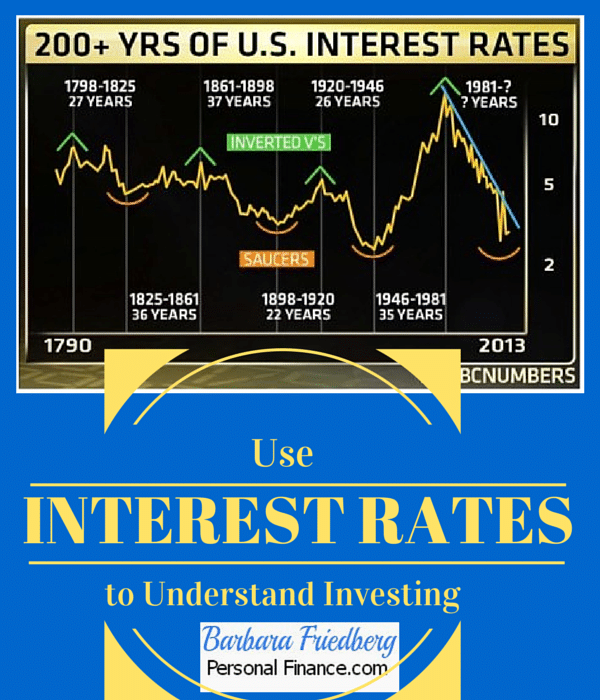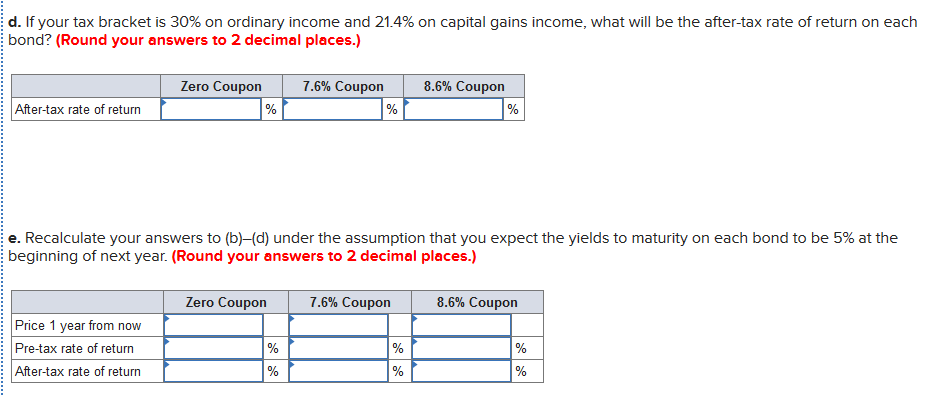42 zero coupon bonds tax
PDF Income Taxes on Zero Coupon Bonds (Preliminary Version) the tax free rate to the after tax rate of return is a common comparison in evaluating taxable and tax free investments. A zero coupon bond pays only at maturity and doesn't pay periodic interest. For a taxable zero coupon bond, the IRS requires that income taxes be paid annually as OID securities How is a zero-coupon bond taxed? - Terasolartisans.com Zero coupon municipal bonds ("zeros") are tax-exempt, intermediate- to long-term bonds purchased at a deep discount. With zero coupon municipal bonds, the compounded interest is exempt from federal income taxes and, in some states, is also free from state income taxes to residents in the state of issuance.
What Is a Zero-Coupon Bond? | The Motley Fool Depending on the issuer, zero-coupon municipal bonds may generate tax-free imputed income, which means you won't have to pay tax until the bond matures -- usually many years in the future....
Zero coupon bonds tax
Zero Coupon Bonds- Taxability Under Income Tax Act, 1961 According to this proviso, tax on long term capital gain on zero coupon bonds shall be lower of the following: - (a) Tax on capital gains computed normally @ 20% on difference of maturity price and purchase price (indexed) or Understanding Zero Coupon Bonds - Part One Here are some general characteristics of zero coupon bonds: Issued at deep discount and redeemed at full face value. Some issuers may call zeros before maturity. You must pay tax on interest annually even though you don't receive it until maturity. Zero coupon bonds are more volatile than regular bonds. Zero Coupon Bond - Investor.gov Because zero coupon bonds pay no interest until maturity, their prices fluctuate more than other types of bonds in the secondary market. In addition, although no payments are made on zero coupon bonds until they mature, investors may still have to pay federal, state, and local income tax on the imputed or "phantom" interest that accrues each year.
Zero coupon bonds tax. Tax on US Treasury STRIPS | Finance - Zacks With a zero coupon Treasury bond, you must pay taxes on the imputed or phantom interest each year. The $100,000 STRIP purchased for $51,400 has a yield to maturity of about 3.3 percent; so in the ... Zero Coupon Municipal Bonds: Tax Treatment - TheStreet , the tax rules for zero-coupon bonds bought as new issues and held to maturity are fairly simple. Whether the bond is taxable or tax exempt, you have to accrue interest on the bond. That means you... How to Buy Zero Coupon Bonds | Finance - Zacks Zero coupon bonds, also known as zeros, are distinct in that they do not make annual interest payments. The bonds are sold at a deep discount, and the principal plus accrued interest is paid at ... Solved: Zero coupon municipal bonds maturation Using the earlier example, if you paid $500 for a 10-year, $1,000 bond getting an interest rate of 7.05%, you would accrue $35.25 of interest in the first year. $500 x 0.0705 = $35.25 Your adjusted issue price, or cost basis, in the bond, would then become $535.25. $500 + $35.25 = $535.25 The following year, you would accrue $37.74 of interest.
Section 2(48) Income Tax: Zero Coupon Bonds - Meaning ... a) Meaning of 'Zero Coupon Bond': Section 2 (48) Income Tax As per Section 2 (48) of Income Tax Act, 1961, unless the context otherwise requires, the term "zero coupon bond" means a bond- (a) issued by any infrastructure capital company or infrastructure capital fund or public sector company or scheduled bank on or after the 1st day of June, 2005; How to Invest in Zero-Coupon Bonds | Bonds | US News The problem can be avoided with a tax-free municipal zero-coupon bond, or by holding the zero in a tax-preferred account like an individual retirement account. Volatility is a second issue ... How is tax calculated on a zero coupon bond? - Quora The brokerage firm calculates it annually—and reports it on your annual tax statement—by multiplying the cost of the bond ($900) by the Yield to Maturity (5.4%). So, on a 2-year, zero-coupon bond you bought for $900, the imputed interest for this year would be $50. You will pay tax on the $50, whether you actually made $50 or not. Zero Coupon Bond Value Calculator: Calculate Price, Yield ... The IRS requires zero-coupon bond holders to pay tax on the "phantom" imputed interest income just as they would if they had received coupon payments, even though there wasn't any interest paid to the bond holder. year: initial value: imputed rate: imputed interest: final value: 1: $5,000: 2.337%: $116.85: 2: 2.337%: $119.58: 3: 2.337%: $122.38 ...
Zero Coupon Bonds (ZCB) & its taxation in the hands of ... Sale, Maturity, Redemption or otherwise transfer of zero coupon bonds is considered as "Transfer" in the hands of investor for levy of capital gains tax under S.2 (47) (iva). Income arising from zero coupon bonds shall be taxed only in the year in which same is transferred or redeemed or matured. How are Bonds Taxed Under the Income Tax Act? - Wint Wealth Zero-Coupon Bonds Zero-coupon bondholders are liable to only capital gain tax as they do not provide any interest income. However, these are issued at a discount. Hence, the difference is taxed as capital gain. 2. Market-Linked Bonds Market-linked bonds offer fixed interest, and the interest rates are linked to the index it is tracking. Zero-Coupon Bonds - Tax Professionals Member Article By ... A zero-coupon bond is a type of fixed income instrument that pays no interest on the principal until maturity. Municipalities and businesses often issue Zero-coupon bonds to make saving for retirement, education, or other purposes more affordable. Taxation Rules for Bond Investors Zero-coupon bonds are issued by governments at discounts and they mature at par values, where the amount of the spread is divided equally among the number of years to maturity. They are...
Are Bonds Taxable? 2022 Rates, Types of Bonds, Tax ... With a zero-coupon bond , you buy the bond at a discount from its face value, don't receive interest payments during the bond's term, and are paid the bond's face amount when it matures. For...
Tax Considerations for Zero Coupon Bonds Tax Considerations Zero coupon bonds have unique tax implications. Technically, you are earning interest every year, even though you do not see it until the end of the bond term. Therefore, you have to pay the taxes on the interest every single year even though you do not get the interest until the end of the arrangement.
TAXABILITY OF ZERO COUPON BONDS - The Tax Talk Zero coupon bonds are taxable under two heads depending upon how the bond is held. If the bonds are held as capital asset, these are taxable under the head "Income from Capital Gains". These can be short term or long term depending upon the holding period. i.e. 12 months. Long term Capital gains will be taxable at the rate of 10%+ cess. No
Publication 1212 (01/2022), Guide to ... - IRS tax forms Zero coupon bonds. Form 1099-OID. Form 1099-OID not received. Reduction for acquisition premium. Transfers during the month. Debt Instruments Issued After July 1, 1982, and Before 1985 Debt Instruments Issued After 1984 Contingent Payment Debt Instruments Inflation-Indexed Debt Instruments Figuring OID on Stripped Bonds and Coupons
The ABCs of Zero Coupon Bonds | Tax & Wealth Management, LLP Zero coupon bonds are subject to an unusual taxation in which the receipt of interest is imputed each year, requiring holders to pay income taxes on what is called "phantom income." Target Dates For individuals, zero coupon bonds may serve several investment purposes.
Impact of Taxation on Zero-Coupon Muni Returns Taxation on zero-coupon munis is only realized upon their sale or maturity. If the bond is sold before its maturity, it is either sold at a discount or a premium in the secondary market. Any price paid above the adjusted issue price (discussed below) will be premium and any price below the adjusted issue price will be discount.

Government reforms capital gains tax. Here is everything you should know about what is capital ...
Calculating the cost basis on a tax free Zero Coupon Bond A tax free zero coupon bond is issued with a yield to maturity of 3.5%. After some time, an investor buys the bond at 50. ( 50 cents on the dollar ). When he buys the bond, the bond has a yield to maturity of 3.4%. After some time, he sells the bond for 80 cents on the dollar.
Tax Considerations for Zero Coupon Bonds - Financial Web Tax Considerations Zero coupon bonds have unique tax implications. Technically, you are earning interest every year, even though you do not see it until the end of the bond term. Therefore, you have to pay the taxes on the interest every single year even though you do not get the interest until the end of the arrangement.
Taxes and zero coupon bonds - FMSbonds.com Tax-exempt interest earned on zero coupon bonds should be reported on your 1040, along with all other tax-exempt interest received. The interest reported is based on the original issue price and yield or, as you stated, "the bond's original accretion." Your adjusted basis in the bonds at any time after purchase would be your actual purchase ...
Advantages and Risks of Zero Coupon Treasury Bonds If issued by a government entity, the interest generated by a zero-coupon bond is often exempt from federal income tax, and usually from state and local income taxes too. Various local...
Zero Coupon Bond - Investor.gov Because zero coupon bonds pay no interest until maturity, their prices fluctuate more than other types of bonds in the secondary market. In addition, although no payments are made on zero coupon bonds until they mature, investors may still have to pay federal, state, and local income tax on the imputed or "phantom" interest that accrues each year.
Understanding Zero Coupon Bonds - Part One Here are some general characteristics of zero coupon bonds: Issued at deep discount and redeemed at full face value. Some issuers may call zeros before maturity. You must pay tax on interest annually even though you don't receive it until maturity. Zero coupon bonds are more volatile than regular bonds.
Zero Coupon Bonds- Taxability Under Income Tax Act, 1961 According to this proviso, tax on long term capital gain on zero coupon bonds shall be lower of the following: - (a) Tax on capital gains computed normally @ 20% on difference of maturity price and purchase price (indexed) or













Post a Comment for "42 zero coupon bonds tax"